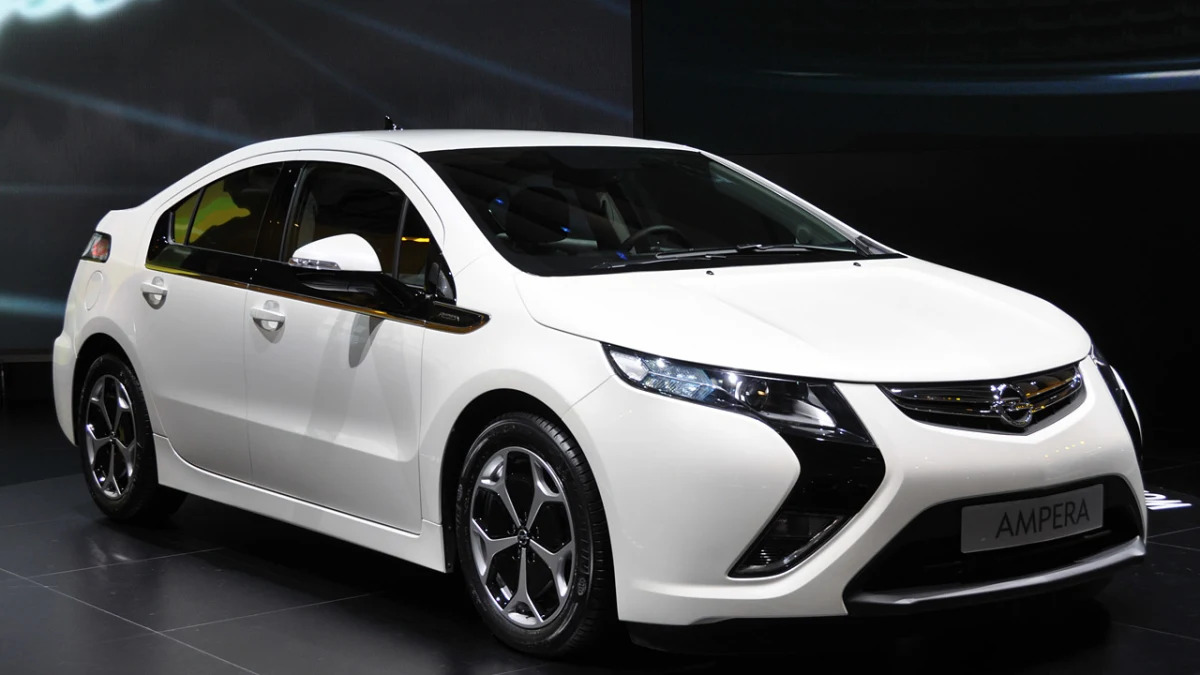2012 Opel Ampera – Click above for high-res image gallery
A report released by WWF-UK, the self-proclaimed "world's leading conservation body," concludes that the UK will need at least 1.7 million plug-in vehicles on its roads by 2020 and 6.4 million by 2030 to achieve its climate change goals. If those marks are met, plug-ins would represent six percent of all of the UK's registered vehicles in 2020 and nearly 18 percent in 2030.
WWF-UK claims that substantial government subsidies, along with other incentives will be necessary to get those numbers of plug-ins on the roads. David Norman, director of campaigns at WWF-UK, says that:
The study concludes by suggesting that biofuels should only be considered as a last resort for sectors where other feasible alternatives for fossil fuels don't exist and further states that the use of biofuels in passenger vehicles should not be a priority.It is vital that people start consuming and traveling less to make a transition to a low-carbon economy and reduce our dependency on oil and emissions from cars. Road transport accounts for 40 per cent of petroleum products consumed in the UK so a switch from conventional cars powered by petrol [gasoline] or diesel to EVs would have a much needed impact on reducing fuel demand. It is clear that at least 1.7 million EVs will be needed by 2020 and 6.4 million by 2030 in order to achieve the level of ambition that we need.
Click here (pdf) to read the WWF-UK's exhaustive 50-page report, titled "Electric avenues: Driving home the case for electric vehicles in the UK."
Photos copyright ©2011 Drew Phillips / AOL
[Source: WWF-UK]
Electric vehicles essential to reducing UK's oil dependency and cutting carbon emissions
30 March 2011
New figures released by WWF-UK today show that at least 1.7 million electric vehicles will be needed by 2020 and 6.4 million by 2030 if the UK is to achieve its climate change targets and even higher numbers of EVs would enable us to reduce our dependency on oil further.
Findings from the report Electric avenues: driving home the case for electric vehicles show that a rapid introduction of EVs is needed if we are to reduce 80 per cent of carbon emissions by 2050.
The study, which examines three different scenarios, finds that the highest levels of EV uptake would lead to very signicant reductions in UK fuel demand representing over £5 billion a year in avoided oil imports. Also in the highest case scenario, the combination of extensive EV uptake , driving less and improving internal combustion engine vehicles could potentially reduce UK fuel demand by 80 per cent and deliver a 75 per cent reduction in car emissions by 2030.
David Norman, Director of Campaigns, WWF-UK says "It is vital that people start consuming and travelling less to make a transition to a low-carbon economy and reduce our dependency on oil and emissions from cars. Road transport accounts for 40 per cent of petroleum products consumed in the UK so a switch from conventional cars powered by petrol or diesel to EVs would have a much needed impact on reducing fuel demand. "
Government subsidies and other incentives will be needed to help get the necessary number of EVs on the road - a minimum of 1 in 17 cars by 2020 and 1 in 6 by 2030 . These incentives will have to attractive enough to overcome consumers' concerns over price, range anxiety and lack of charging points.
WWF has a vision of a world that is powered by 100 per cent renewable resources by 2050 . EVs will generate only limited additional electricity demand and this growth can be managed with deferred charging and smart grids to ensure peak demand is limited.
30 March 2011
New figures released by WWF-UK today show that at least 1.7 million electric vehicles will be needed by 2020 and 6.4 million by 2030 if the UK is to achieve its climate change targets and even higher numbers of EVs would enable us to reduce our dependency on oil further.
Findings from the report Electric avenues: driving home the case for electric vehicles show that a rapid introduction of EVs is needed if we are to reduce 80 per cent of carbon emissions by 2050.
The study, which examines three different scenarios, finds that the highest levels of EV uptake would lead to very signicant reductions in UK fuel demand representing over £5 billion a year in avoided oil imports. Also in the highest case scenario, the combination of extensive EV uptake , driving less and improving internal combustion engine vehicles could potentially reduce UK fuel demand by 80 per cent and deliver a 75 per cent reduction in car emissions by 2030.
David Norman, Director of Campaigns, WWF-UK says "It is vital that people start consuming and travelling less to make a transition to a low-carbon economy and reduce our dependency on oil and emissions from cars. Road transport accounts for 40 per cent of petroleum products consumed in the UK so a switch from conventional cars powered by petrol or diesel to EVs would have a much needed impact on reducing fuel demand. "
Government subsidies and other incentives will be needed to help get the necessary number of EVs on the road - a minimum of 1 in 17 cars by 2020 and 1 in 6 by 2030 . These incentives will have to attractive enough to overcome consumers' concerns over price, range anxiety and lack of charging points.
WWF has a vision of a world that is powered by 100 per cent renewable resources by 2050 . EVs will generate only limited additional electricity demand and this growth can be managed with deferred charging and smart grids to ensure peak demand is limited.



Sign in to post
Please sign in to leave a comment.
Continue